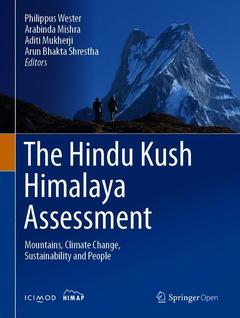Description
The Hindu Kush Himalaya Assessment, 1st ed. 2019
Mountains, Climate Change, Sustainability and People
Language: English
Subjects for The Hindu Kush Himalaya Assessment:
Keywords
Open Access book on Hindu Kush Himalaya; Climate Change in the Hindu Kush Himalaya; Sustainable Mountain Development; Environmental Assessment; HKH Assessment Report; Biodiversity and Ecosystem Services in the HKH; Energy Needs in Asia; Water Security; Availability; Use and Governance; Food Nutrition and Security in Asia; Disaster Risk Reduction and Increasing Resilience; Poverty and Vulnerability in Mountain Livelihoods; Climate Change Adaptation; Governance; Drivers and Consequences of Migration; Environmental Governance in the Hindu Kush Himalaya; Sustainable Mountain Development; Environmental Geography; Climate change management; climate change
Publication date: 01-2019
627 p. · 21x27.9 cm · Paperback
Publication date: 01-2019
627 p. · 21x27.9 cm · Hardback
Description
/li>Contents
/li>Biography
/li>Comment
/li>
This open access volume is the first comprehensive assessment of the Hindu Kush Himalaya (HKH) region. It comprises important scientific research on the social, economic, and environmental pillars of sustainable mountain development and will serve as a basis for evidence-based decision-making to safeguard the environment and advance people?s well-being. The compiled content is based on the collective knowledge of over 300 leading researchers, experts and policymakers, brought together by the Hindu Kush Himalayan Monitoring and Assessment Programme (HIMAP) under the coordination of the International Centre for Integrated Mountain Development (ICIMOD). This assessment was conducted between 2013 and 2017 as the first of a series of monitoring and assessment reports, under the guidance of the HIMAP Steering Committee: Eklabya Sharma (ICIMOD), Atiq Raman (Bangladesh), Yuba Raj Khatiwada (Nepal), Linxiu Zhang (China), Surendra Pratap Singh (India), Tandong Yao (China) and David Molden (ICIMOD and Chair of the HIMAP SC).
This First HKH Assessment Report consists of 16 chapters, which comprehensively assess the current state of knowledge of the HKH region, increase the understanding of various drivers of change and their impacts, address critical data gaps and develop a set of evidence-based and actionable policy solutions and recommendations. These are linked to nine mountain priorities for the mountains and people of the HKH consistent with the Sustainable Development Goals.
This book is a must-read for policy makers, academics and students interested in this important region and an essentially important resource for contributors to global assessments such as the IPCC reports.




